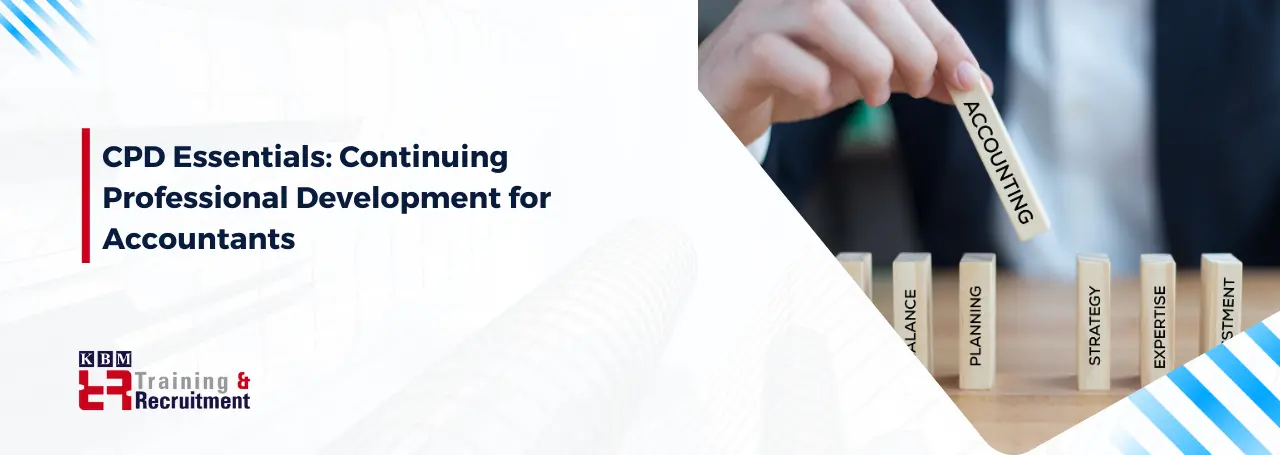Continuing Professional Development (CPD) is the cornerstone of career advancement and excellence in any field, and accountancy is no exception. In a profession marked by evolving regulations, emerging technologies, and shifting market dynamics, staying abreast of the latest trends and honing one's skills is essential for success.
In this blog, we'll explore the significance of CPD for accountants, its key components, and how it contributes to professional growth and development.
Understanding the Importance of CPD
CPD is not merely a box-ticking exercise; it's a strategic investment in one's career and professional competency. For accountants, CPD serves several critical purposes:
-
Staying Updated with Regulations: In a constantly changing regulatory landscape, CPD ensures that accountants remain informed about the latest standards, laws, and compliance requirements. Whether it's updates to tax legislation, changes in accounting standards, or new reporting requirements, CPD helps accountants stay ahead of the game and ensure compliance with regulatory obligations.
- Adapting to Technological Advances: Technology is transforming the accounting profession, with automation, data analytics, and cloud computing reshaping traditional workflows. CPD allows accountants to upskill in emerging technologies, learn new software tools, and leverage innovations to enhance efficiency and effectiveness in their roles.
- Enhancing Technical Competency: CPD enables accountants to deepen their technical knowledge and expertise in specialised areas such as auditing, tax planning, forensic accounting, or financial analysis. By attending training sessions, seminars, and workshops, accountants can sharpen their skills, stay current with industry best practices, and deliver high-quality client services.
- Fostering Professionalism and Ethical Conduct: CPD reinforces ethical standards and professional conduct, instilling a commitment to integrity, objectivity, and accountability in accountants. Through case studies, discussions, and interactive sessions, CPD encourages reflection on ethical dilemmas and promotes adherence to professional codes of conduct.
- Facilitating Career Advancement: CPD plays a crucial role in career progression, enabling accountants to demonstrate their commitment to ongoing learning and development. By accumulating CPD hours and obtaining relevant certifications, accountants can enhance their credentials, differentiate themselves in the job market, and unlock new opportunities for advancement and promotion.
Key Components of CPD
CPD for accountants encompasses diverse activities and learning experiences tailored to individual career goals and professional development objectives. Some critical components of CPD include:
- Formal Training Programmes: These include structured courses, workshops, and seminars offered by professional bodies, academic institutions, or industry organisations. Topics may range from technical accounting and tax updates to leadership and management skills development.
- Self-Directed Learning: Self-directed learning allows accountants to pursue topics of interest at their own pace through reading books, articles, research papers, or online resources. It encourages curiosity, exploration, and independent study, enabling accountants to delve deeper into specific areas of accounting or related disciplines.
- On-the-Job Training and Experience: Learning through practical experience is invaluable for accountants, providing opportunities to apply theoretical knowledge to real-world scenarios. On-the-job training may involve shadowing senior colleagues, participating in client engagements, or taking on new organisational responsibilities.
- Professional Networking and Collaboration: Engaging with peers, mentors, and industry experts through networking events, conferences, and online forums can enrich the CPD experience. Networking facilitates knowledge sharing, idea exchange, and collaboration, allowing accountants to learn from others' experiences and perspectives.
- Mentorship and Coaching: Mentorship programmes pair experienced professionals with mentees seeking guidance and support in their career development. Mentors provide valuable insights, advice, and encouragement, helping mentees explore challenges, set goals, and succeed in their careers.
Implementing CPD Strategies
Effective CPD requires careful planning, goal setting, and a commitment to lifelong learning. Here are some strategies for implementing CPD effectively:
- Set Clear Objectives: Define specific learning and career goals to guide your CPD activities. Consider areas where you want to develop expertise or improve skills, and tailor your CPD plan accordingly.
- Allocate Time and Resources: Dedicate time and resources to CPD activities, whether attending training sessions, reading industry publications, or attending professional development events. Treat CPD as a priority and invest in your professional growth.
- Document and Reflect: Record your CPD activities, including dates, hours, and learning outcomes. Reflect on your experiences, lessons learned, and areas for improvement, and use this feedback to inform future CPD planning.
- Seek Feedback and Evaluation: Solicit feedback from peers, supervisors, or mentors to assess the impact of your CPD efforts. Evaluate your progress towards your CPD goals regularly and adjust your plan to stay on track.
- Stay Curious and Open-Minded: Embrace a growth mindset and remain open to new ideas, perspectives, and learning opportunities. Stay curious about developments in the accounting profession and seek out diverse CPD experiences to broaden your knowledge and skills.
Conclusion
CPD is a fundamental aspect of professional development for accountants, offering opportunities for learning, growth, and career advancement. By staying updated with regulations, adapting to technological advances, enhancing technical competency, fostering professionalism, and facilitating career progression, CPD equips accountants with the skills to excel in a dynamic and competitive landscape. By embracing CPD as a lifelong commitment to learning and growth, accountants can stay relevant and resilient and tackle the challenges and opportunities of the accounting profession.






















